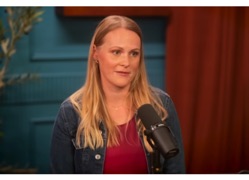Mom of Eight Explains How She and Baby Both Survived Rare Ectopic Pregnancy [Video]
[Alex] Gooding offered advice for parents facing a prenatal diagnosis, which is not to make rash decisions. The pressure to have an abortion can be strong and doctors often scare women, who feel rushed to choose abortion. "Some things can't be undone," said Gooding. "... Take it with great care for the lives at stake, because there's always more than one life going on."
 [LiveAction.org] Mother of eight, Alex Gooding, recently appeared on The Lila Rose Show to share her story of choosing life in the face of a high-risk pregnancy that put her and her baby's life in danger. (Screengrab image: via The Lila Rose Show)
[LiveAction.org] Mother of eight, Alex Gooding, recently appeared on The Lila Rose Show to share her story of choosing life in the face of a high-risk pregnancy that put her and her baby's life in danger. (Screengrab image: via The Lila Rose Show)
At five weeks pregnant, Gooding was advised to have an abortion because her baby had implanted in the scar from Gooding's previous C-section. A cesarean scar ectopic pregnancy (CSEP) is considered an ectopic pregnancy, meaning that even in states with pro-life laws, ending the pregnancy would have been an option.
She chose life.
Key Takeaways:
• Alex Gooding appeared on The Lila Rose Show to discuss multiple aspects of her life, including her high-risk pregnancy.
• Moments after she was diagnosed with a cesarean scar ectopic pregnancy with her eighth child, a doctor advised Gooding to have an abortion. She refused.
• Doctors told her that her baby was likely to die and that she could also die if she didn't have an abortion, but after finding a doctor to help her, she and her baby both survived.
• In three separate studies of women who have had cesarean scar ectopic pregnancies, 100% of the women survived.
The Details:
In Episode 245 of The Lila Rose Show, Alex Gooding spoke to Live Action founder and president, Lila Rose, about the pregnancy with her youngest daughter, Chloe.
"Chloe's extra special because with her pregnancy, I had a C-section scar ectopic, which means that she implanted in my C-section scar. So it's extremely high risk," she said. "It's a pregnancy that ACOG recommends termination, which is really sad. And right from the get-go, five weeks, we knew this. And so it was like a really heavy burden our entire pregnancy, knowing that [she] and I were both in danger the entire pregnancy."
She added that she couldn't have lived with herself if she had chosen to abort. "One, that choice was never really on the table, but ... I would sit and be like, 'Why would I kill my baby over a what if?'"
As an influencer with 175,000 Instagram followers at GrowingGoodings, her decision to choose life came with backlash from strangers on the internet who told her that she was 'committing suicide' for having Chloe, and that not aborting was 'not fair' to her other children.
She said that in a Facebook group for moms with CSEP, there are new moms joining almost daily, asking for advice. She tells them to find an accreta center of excellence. Though not all states have a center, doctors who treat these patients are learning more about CSEP with each patient.
Her own doctor told her that he learned "invaluable" information from monitoring her pregnancy from week five to week 33. And with C-sections on the rise, Gooding believes CSEP cases will also rise.
"Those are the doctors you want," she said. "The doctors that are willing to be like, 'Hey, let's advance our medical care. We live in America...."
Women who decide not to end the pregnancy are at an increased risk of placenta accreta, a potentially dangerous condition in which the placenta grows into the uterine wall. If that were to occur, the mother would need to deliver the baby early by C-section. Mother and child would need to be followed closely by a maternal-fetal medicine doctor who specializes in high-risk pregnancies. Gooding and preborn baby Chloe were followed by a doctor who had experience in CSEP and had never had a patient die.
At 33 weeks, Chloe was delivered by C-section and was brought to the neonatal intensive care unit of the hospital; Gooding was taken for a hysterectomy (a common outcome in C-section ectopic pregnancies). But both survived.
This media outlet exploited a family's struggles just to promote abortion
"There are risks to having a hysterectomy, but the benefits outweighed [the risks]. One, she's alive and I'm alive. So we're good to go. I can go to PT and do what I need to do for my body now that we're both alive and well. We made it!" she said, adding, "It's crazy that someone, multiple people, thought she was not worth being here."
Gooding offered advice for parents facing a prenatal diagnosis, which is not to make rash decisions. The pressure to have an abortion can be strong and doctors often scare women, who feel rushed to choose abortion.
"Some things can't be undone," said Gooding. "... Take it with great care for the lives at stake because there's always more than one life going on."
The Context:
There are risks to the mother and baby, including uterine rupture, hemorrhage, placenta accreta, and fetal loss. There is also a large chance that, like Gooding, mothers experiencing C-section scar ectopic pregnancies will need hysterectomies. But research is showing that the risk to the mother's life is not as prominent as doctors believe or proclaim.
In fact, there are at least three major studies that have been carried out on women with CSEPs, and in each one of the studies, every woman survived. As reported by pro-life activist Sarah Terzo, in a study of 10 women with CSEP, all ten gave birth to healthy babies and survived.
In a second study of 17 women with CSEP, all 17 mothers survived, but sadly, one of the babies did not.
A third study found a 62.5% possibility of delivering a living baby and a 37.5% chance of the mother needing a hysterectomy, but again, all of the mothers survived... Subscribe for free to Breaking Christian News here
Read the rest of this inspiring article, and watch the video Here.

